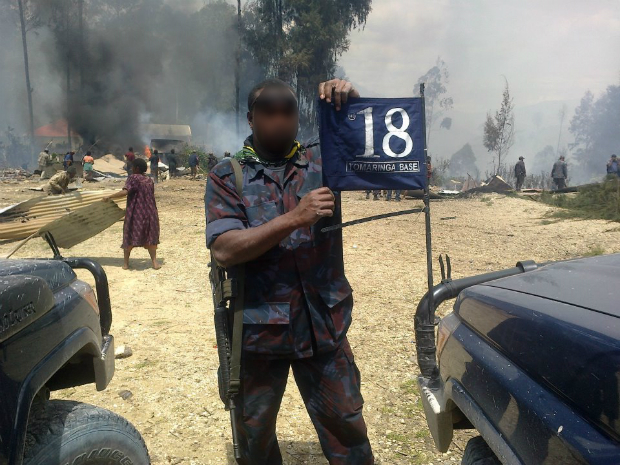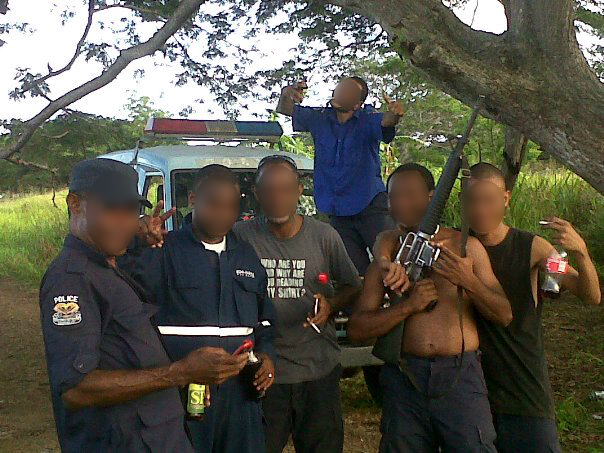Warning: This article contains graphic accounts of violence.
Facts on the recent riot at the Manus Island detention facility, and subsequent death of an asylum seeker, remain sketchy. It appears at the very least that live ammunition was employed by Australian-funded mobile squad officers, a paramilitary wing of the Royal PNG Constabulary, which has a well-earned reputation for brutality.
If this is indeed proven to be the case, it should not come as a surprise to the Australian government. The mobile squads, which have been stationed on the island to secure the facility, have a documented history of "solving problems" through extreme violence.
In an interview I did back in 2006 with a former Assistant Police Commissioner the mobile squads’ modus operandi was described with disarming frankness:
"Basically the mobile squad people are semi-military, they are aggressive, they don’t do what normal policeman do, they go in there and they beat a few heads in. I am talking frankly, they will knock a few heads in, burn a few houses down, shoot a few pigs, shoot at cars … That is not policing, that is not normal policing … The mobile squads operated with a modus operandi of frightening people."
By then, however, I was familiar with their methods. The mobile squads had been deployed on the island of Bougainville during 1989 at the behest of Rio Tinto subsidiary, Bougainville Copper Limited, when local landowner activists shut down the Panguna copper mine.
With logistic assistance from the mine operator, they tortured and executed civilians, raped women and torched homes, in an action locally referred to as "destructions".
At the time, the Australian government was right behind the mobile squads, believing they were better equipped to deal with internal security "problems", rather than the PNG Defence Force who were geared towards the unlikely prospect of an external threat.
Australia has funded, trained and armed the mobile squads for a long time. The Immigration Department, in 2013, was funding the mobile squads to the tune of around $100 a day, in a country where the average wage for security staff is $1.50 an hour, according to a report from Fairfax's Rory Callinan.
Callinan also reported an incident in July, when mobile squad officers had beaten 21 year old Raymond Sipuan to death in front of other islanders. He wrote that the mobile squads also police domestic tensions resulting from the Manus detention centre.
"The presence of the paramilitary unit on the island suggests PNG and Australian officials fear a major clash with landowners who have already threatened a protest if they do not get a cut out of the asylum seeker detention centre projects."
Over a decade earlier, at a 1990 parliamentary inquiry, Michael Commins, the Director of the Australian International Development Assistance Bureau’s Pacific and PNG division said "the main program … [was]about $19.7m worth in support for the mobile squads".
This support was premised, a Defence Department colleague explained, on the Australian government’s belief that the mobile squads were "relatively effective within the norms and conventions of Papua New Guinea". A subtle nod to their fearsome reputation, orientalised as normal "tribal behaviour". Those who have had their homes burnt, or loved ones killed, regularly contest this neocolonial view of PNG’s "conventions".

Despite the fact the mobile squads roamed the island of Bougainville for years sacking villages and murdering civilians, no one in the police command was held to account, nor has there ever been a subsequent inquiry into the atrocities committed by PNG’s security forces during its decade long civil war, in which Australia was deeply enmeshed.
Forums for acknowledging abuses, and redressing them, have thus gone wanting. As a result, mobile squads continue to play the role of trouble-shooter in zones of contention that often centre upon controversial resource projects. Exxon’s massive liquefied natural gas project is one example.
Back in April 2012, for instance, unarmed workers stationed at the project’s Tamadegi Camp confronted mobile squad officers, who had allegedly manhandled local landowners and burnt several homes. Live ammunition was purportedly used to disperse the crowd.
One local worker was injured, and another was killed. Exxon claimed the deceased worker died from an asthma attack. An inquiry was promised. Its results, at least, were never made public.
Perhaps unsurprisingly, Human Rights Watch recently noted, "physical and sexual abuse of detainees — including children — by police and paramilitary police units is [still]widespread". This echoed findings made by HRW in 2005 where they documented numerous cases of gratuitous human rights abuses by the mobile squads.
Sharon, a 16 year old, is one of many cases:
"At 11:00 PM on the 15th March, 2004, I was at the post office walking towards Boroko police station. I was walking with a girl friend of mine … the 10 seater [a mobile squad vehicle]stopped in front of me. I was asked to jump in the vehicle. But I refused. But one member came out from the back of the vehicle with a cable wire and belted me twice at my buttock and forced me to jump into the vehicle … [The] driver forced, me to suck his penis and I kept resisting … he managed to put me down at the back of the vehicle and had sex with me until he released sperm into me. He did that without a condom. He left me and went away. I tried to lift my pants and jean. Another policeman, in uniform came to me and forced me to have sex."
After hearing atrocious cases like this, it is tempting to blame police violence at Manus Island on the "grunts". But the reality is these men are trucked across PNG on gruelling schedules to solve problems they have not created, and which they have no direct interest in.

Their wives and families often live far away in dilapidated accommodation. They have developed a culture of violence, bravado and drinking, principally because they are thrust into heated and contested situations by governments and resource operators in need of a quick fix.
These criminogenic arrangements are often cloaked in a superficial garb of voluntary human rights agreements that regulate the mobile squads’ conduct.
That brings us to Manus Island. Once again, Australia is outsourcing policy challenges to PNG — as if the country did not already have enough on its plate — and oiling palms with promises of political tribute.
If it is indeed proven that the mobile squads are responsible for violence at the Manus Island facility, this is not an exceptional event, it is part of pattern. It is a pattern Australia has ignored, and when inclined, applauded and sponsored.
Sadly, it is aggrieved landowners, and vulnerable urbanites who often pay the price. Now asylum seekers are too.
Donate To New Matilda
New Matilda is a small, independent media outlet. We survive through reader contributions, and never losing a lawsuit. If you got something from this article, giving something back helps us to continue speaking truth to power. Every little bit counts.



